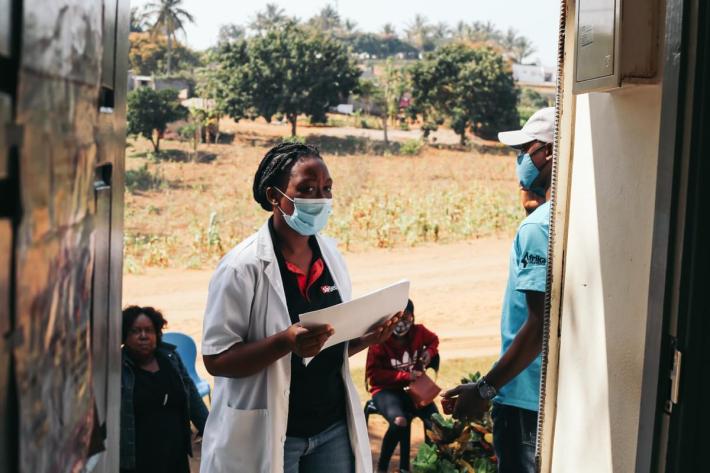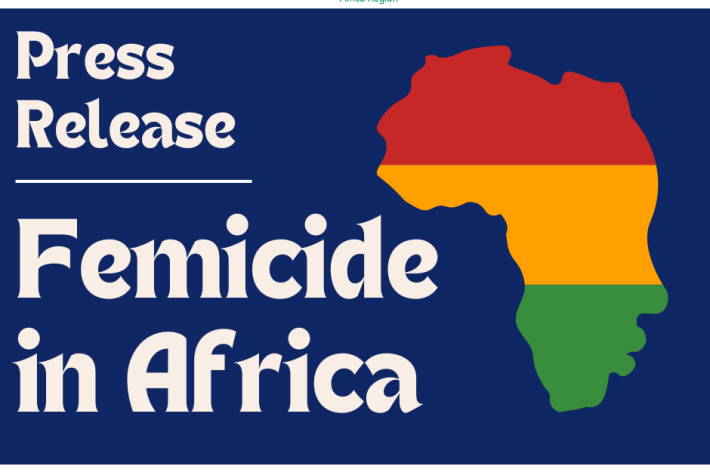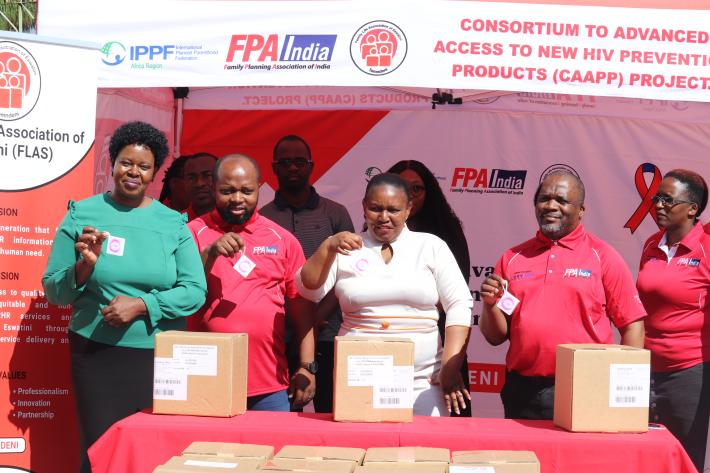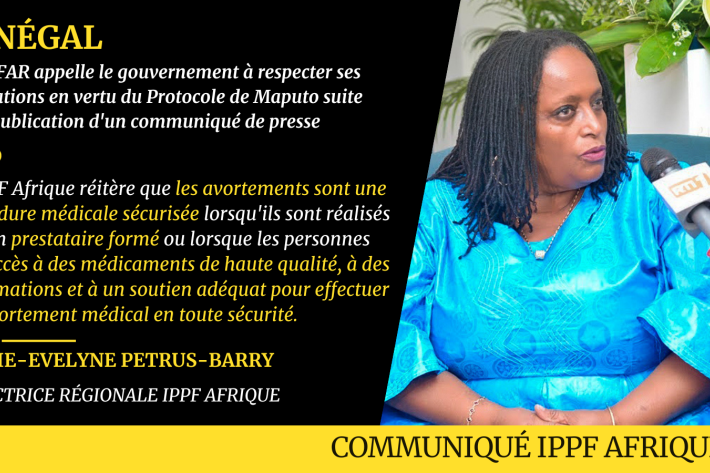Latest press releases
A selection of stories from across the Federation
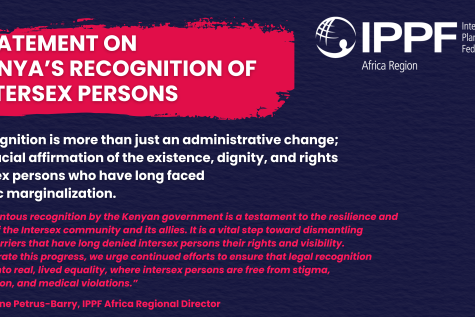
Kenya
IPPF Africa Region Welcomes Kenya’s Landmark Recognition of Intersex Persons
IPPF Africa Region Welcomes Kenya’s Landmark Recognition of Intersex Persons Nairobi, Kenya: 13 February 2025 – On 31 January 2025, Kenya has taken a groundbreaking step towards inclusivity and human rights by officially recognizing intersex as a sex marker alongside male and female in the Kenya Legal Notice 153 of 2025.


| 24 September 2024
Major New Health Programme to Expand Sexual and Reproductive Health Services in East and Southern Africa
Nairobi, 23 September 2024 – A groundbreaking £75.125 million project has been announced by the International Planned Parenthood Federation (IPPF) and its partners, the International Rescue Committee (IRC), Options, Ipas, and Johns Hopkins University Centre for Communication Programmes, to transform sexual and reproductive health services across East and Southern Africa. This large-scale initiative will benefit seven countries, supporting millions of women, girls, and vulnerable communities in Burundi, Ethiopia, Madagascar, Somalia, South Sudan, Sudan, and Zambia. This programme, known as Women’s Integrated Sexual Health 2 (WISH 2) Lot 2, is funded by the UK Foreign, Commonwealth and Development Office (FCDO). As part of FCDO WISH Dividend, it builds on the successes of FCDO’s £272 million Women’s Integrated Sexual Health (2018-2024) programme, which spanned 27 countries across Africa and Asia. Over its lifespan, the first WISH programme supported over an estimated 16.9 million women and girls, helping them gain access to critical SRHR services. FCDO’s continued partnership with IPPF for this next phase of WISH was unveiled by FCDO's Chris Carter, on behalf of the UK Minister for Africa, Lord Collins, during the United Nations General Assembly (UNGA) side event, “SRHR: Securing reproductive choice for the next generation.” Announcing FCDO’s partnerships with IPPF, MSI Reproductive Choices and the Children's Investment Fund Foundation, Chris Carter noted the new programme will play a critical role in increasing women's voice, choice and control across 13 countries in Africa.” With the goal of delivering over seven million ‘couple years protection,’ the programme will address critical healthcare gaps, promote reproductive choice, and tackle harmful social norms. It will also provide urgent support to improve policies, strengthen health systems, and safeguard the reproductive rights of women and girls, especially in areas affected by conflict and displacement. At the heart of this initiative is a focus on reaching the most marginalised groups, including young women and girls under 20, those living in poverty, people with disabilities, and communities in conflict zones. Importantly, WISH2 will also work to improve access to safe abortion care and counteract the growing threats to women’s and girls' sexual and reproductive health rights. IPPF Director General Dr Alvaro Bermejo emphasised the critical need to protect and expand access to SRHR. “WISH2 will continue our mission of empowering women and girls across Africa to unlock their full potential. We will not only tackle the rollback of SRHR rights but also strengthen disability inclusion while delivering sustainable healthcare solutions,” said Dr Bermejo. “We’re grateful to the UK Government for their unwavering support in this important work.” Elshafie Mohamed Ali, Executive Director of Sudan Family Planning Association (SFPA) said “WISH2 is essential given Sudan’s current circumstances, particularly the ongoing conflict since April 15, 2023. The programme addresses the growing need for sexual and reproductive health services, offering crucial support to vulnerable communities amidst increasing instability and humanitarian challenges.” Chris Carter, Deputy Director, Head of Human Development Department, highlighted the impact of this new initiative: “Access to sexual and reproductive health services saves lives, empowers women and girls, and supports education, transforming lives and entire livelihoods. This project will amplify women’s voice, choice, and control across Africa, and we are proud to partner with IPPF and African organizations in this critical mission.” For media enquiries, please contact [email protected]
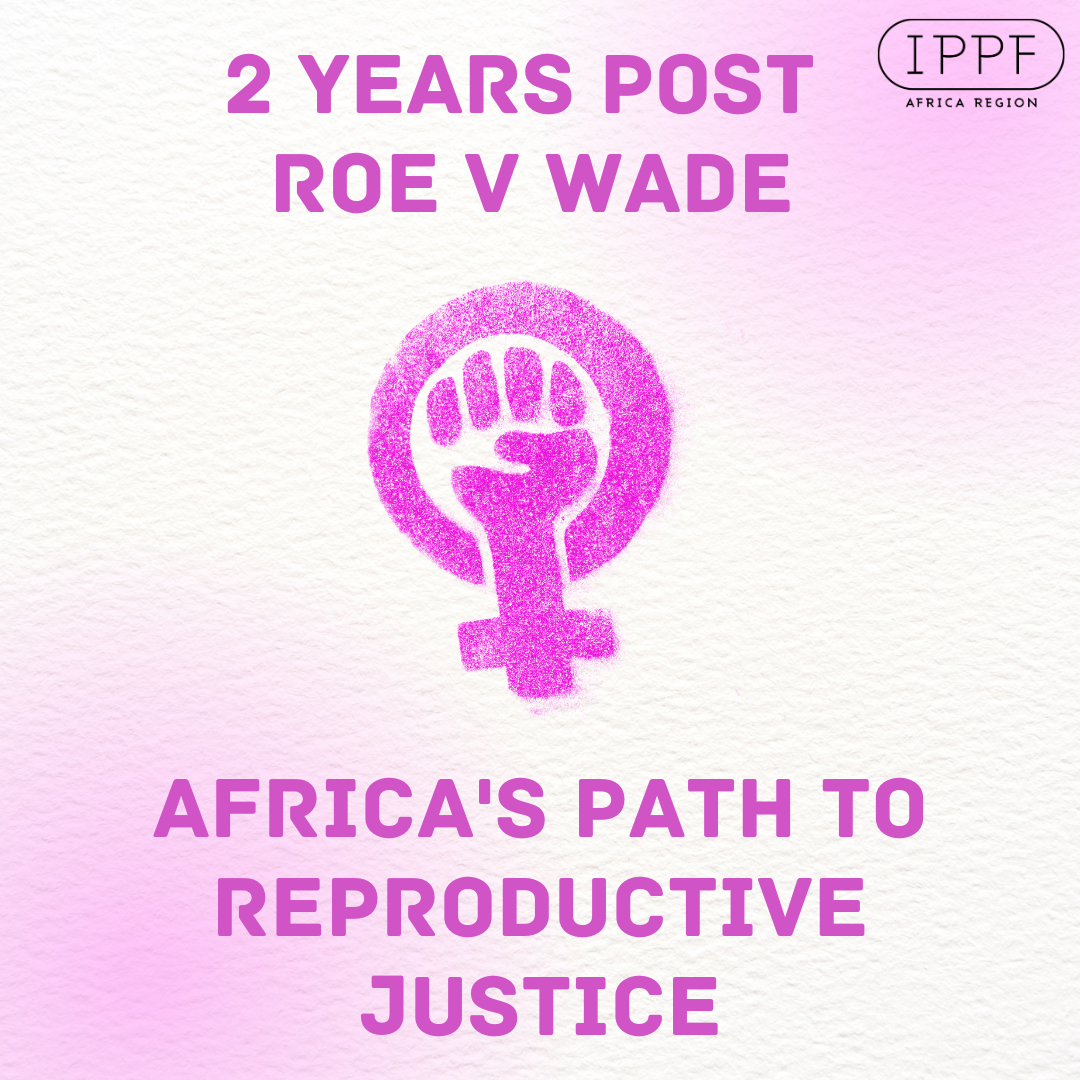
| 24 June 2024
Two Years Post-Roe: Africa's Path to Reproductive Justice
By Marie-Evelyne Petrus-Barry and Mallah Tabot June 24th this year marks the second anniversary of the repeal of Roe v. Wade, a seismic shift in the landscape of reproductive rights that has reverberated far beyond the borders of the United States. In June 2022, the US Supreme Court overturned the landmark 1973 ruling which had established a woman's legal right under the US Constitution to have an abortion. This repeal has had global repercussions, further emboldening anti-abortion movements, and influencing reproductive rights debates, policies, funding, and services. In Africa, not only did it send shockwaves, but has also prompted a reflection and re-evaluation of our role as African stakeholders in shaping the future of reproductive rights everywhere on the continent. In many countries on the continent where access to abortion care is already fraught with challenges, this development serves as a stark reminder of the fragility of reproductive rights. It highlights the danger of complacency and the need for vigilance in protecting and advancing these rights and reminds us that abortion is not a moral issue for debate, it is healthcare, and a fundamental human right. While the repeal has sparked renewed activism and advocacy for rights actors on the continent, it has also further emboldened conservative factions and a growing anti-rights movement to push for more restrictive laws and policies through novel tactics to further their agenda. Under the guise of protecting the family, anti-abortion narratives are used as entry points to infiltrate political, legislative and advocacy spaces to roll back hard-won gains. Even going as far as setting up alternative research institutions in Africa to generate quasi-scientific evidence to counter reputed research bodies like the Guttmacher Institute. Increasingly, a key tactic is the weaponizing of First Ladies to further the anti-rights agenda. In Kenya, the National Family Protection Policy, drafted by a major anti-rights group, Citizen Go was launched by the First Lady, despite not undergoing public participation and receiving lots of criticism from rights actors. In Uganda, the Geneva Consensus declaration, an anti-abortion joint statement is making inroads in the country through its affiliation with the First Lady, even though the “Consensus” has no legal or policy underpinning. This trajectory underscores a critical reality: Nothing is safe, our continent is a battleground for the ideological struggles taking place elsewhere in the world, sadly, our human rights, including SRHR are at the highest risk. We must forge our own path, grounded in the unique political contexts of our nations through our partnerships with local organizations and governments. As one of the leading voices on SRHR advocacy and services in Africa, IPPF believes now is the time for Africa to assert its leadership in the global fight for reproductive justice. In collaboration with other key actors on the continent and beyond, IPPF is committed to continue playing a pivotal role in the SRHR landscape of Africa. We will continue to expand access to abortion care, especially for the most vulnerable and marginalized, comprehensive sexuality education, contraceptive services and reaching those in humanitarian settings. Despite these efforts, much work remains. The disparities in access and the entrenched stigma surrounding abortion care continue to hinder our progress. One of the key initiatives we are proud to be part of is the CATALYSTS Consortium, which was born out of this landmark ruling in June 2022. Following the ruling, IPPF Africa Region, Ipas Africa Alliance, Centre for Reproductive Rights Africa, Population Council Kenya and FIGO came together to discuss the ruling’s implications on the continent and consider the case for an abortion consortium that might more effectively protect and promote abortion rights in Africa. Launching on June 27th, the Consortium has set an ambitious and unambiguously comprehensive vision for abortion care for all in Africa. This type of organic consortium on abortion has not yet been attempted. As African thought leaders, field builders and a vehicle for driving accountability, we are a Consortium of the brave with a track record of never backtracking. Our solution is powerful, impactful, and led by those doing the work while building an African critical mass that can effectively open doors, advocate more strongly and underpin bolder action. CATALYSTS is Africa-led, committed to decolonizing, and reframing the discourse around abortion rights in Africa by centring African perspectives, experiences, and voices. But we cannot achieve our goals in isolation. It is imperative that African governments, activists, youth groups and other civil society groups recognize the urgency of prioritizing reproductive rights. Governments must decriminalize abortion, ensure access to contraceptives, and protect the rights of individuals to make informed choices about their reproductive health and rights. Cross-border activist solidarity is imperative if we must move the needle on reproductive justice, and young people should be recognized as not just a passive group with SRHR needs but as critical actors at the centre of the journey towards reproductive justice. IPPF ARO stands ready to champion this charge, but we need the support and collaboration of governments, communities, and international partners. CATALYSTS launches on June 27th after close to two years of consultation, course correction, investment, and realignment. I invite you to join us in bringing this vision to life, which will be marked by the unveiling of the website, Theory of Change, and call to action. It promises to be a celebration of our collective achievements and a testament to the transformative power of collaboration. As we mark the second anniversary of the Roe v. Wade repeal, the stakes could not be higher for African SRHR actors. The urgent need for a unified and proactive approach to safeguard and advance reproductive rights on the continent is imperative as the path forward requires bold action, unwavering commitment, and a collective direction. For us, the lesson is clear: They are coming for us, bolder, stronger, and more organized, and we cannot depend on the legal frameworks or political will of foreign nations to safeguard our reproductive rights. Instead, we must strike back and reclaim our narrative, and enforce our own robust policies that reflect the needs and realities of our people.











